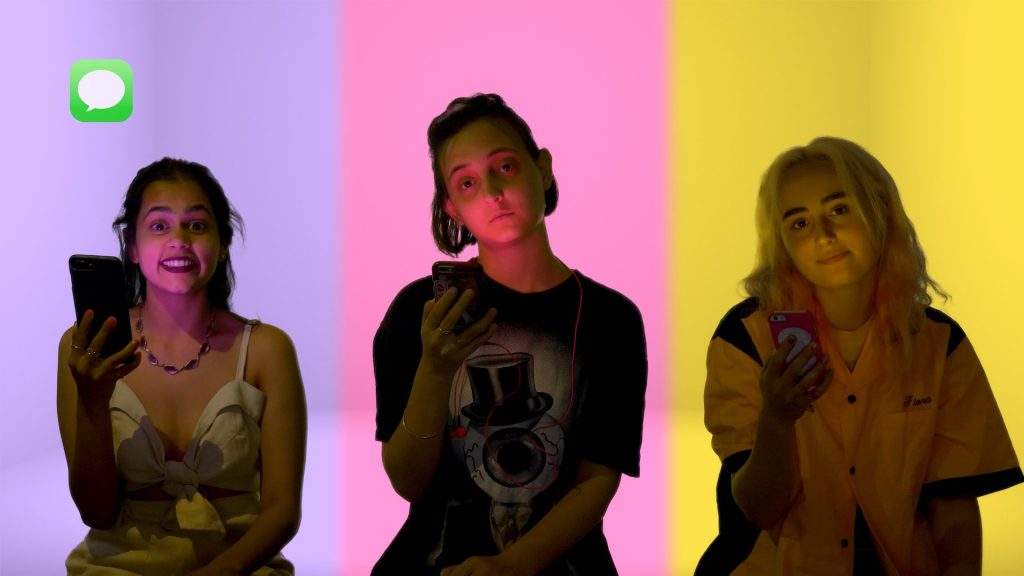comedy, CRSHD, Deeksha Ketkar, Emily Cohn, film festivals, Isabelle Barbier, Isabelle Kenet, LGBTQ, movies, New York City, reviews, Sadie Scott, Tribeca Film Festival
April 30, 2019
by Carla Hay

Directed by Emily Cohn
World premiere at the Tribeca Film Festival in New York City on April 30, 2019.
Teenage sex comedies aren’t anything new, but we’re seeing more of them from a female viewpoint, on and off screen. “CRSHD,” written and directed by Emily Cohn, is about three young women in their first year of college who want to hook up with a crush and possibly lose their virginities at an on-campus party that takes place before the students go on a summer break. The teens are best friends with each other, and they make a pact to give each other updates about their pursuit of sexual adventures.
If this plot sounds similar to the raunchy 2018 comedy “Blockers,” the two movies do have several things in common on the surface. In both movies, the three main characters are sexually impatient female co-eds with similar goals to lose their virginities. Two of the friends are white, while the other is Indian-American. One of the white friends is sexually attracted to other women, while the other two friends are heterosexual. And both movies were directed by a woman. (Kay Cannon directed “Blockers.”) But that’s where the similarities end.
The barely legal teens in “Blockers” are still living with their parents until they go away to college, so the movie has an extra plot layer of meddling and nosy parents who try to block their daughters’ plans to lose their virginities at a prom after-party. Because the young women of “CRSHD” are living on campus, there’s no parental interference in their party plans. The three best friends in “CRSHD” are awkward Izzy Alden (played by Isabelle Barbier), free-spirited Fiona Newman (played by Sadie Scott) and sensible Anuka Deshpande (played by Deeksha Ketkar). They look for potential hookups on social media and in their surroundings on and off campus.
When popular student Elise (played by Isabelle Kenet) invites them to an exclusive party, the three friends see it as the perfect opportunity to find the sex partner they want. Elise’s party has a catch: The only people invited are those who have been anonymously named by someone else as his or her “crush.” In the movie, it’s called being “crushed”—or as it’s written in abbreviated social-media lingo “CRSHD.” The person doing the crushing has the option to reveal their feelings to the person they desire at the party—kind of like a sexual “secret Santa.” Fiona has a crush on Elise, and has her sights set on her, but Izzy and Anuka aren’t so sure who they might end up with at the party.
“Blockers” has the kind of broad, slapstick comedy that you would expect from a big-studio film. The comedy of “CRSHD” doesn’t need bombastic stunts, and therefore has more of a “slice of life” indie tone. “CRSHD” is the kind of movie where people who are supposed to be in their late teens actually talk like teenagers, instead of sophisticated people in their 20s or 30s. Because social media is a huge part of the characters’ lives in “CRSHD,” the movie uses an eye-catching framing device of having the characters talk directly to the screen in a conversational tone whenever they’re sending a message on social media, while the actors are backlit with neon coloring. A symbol in the left-hand corner of the screen indicates if they’re communicating by text, Instagram, Twitter or Facebook.
From the start, it’s clear that Izzy is written as the character that viewers are meant to sympathize with the most. She not as confident as her two friends, and she frequently masks her insecurities by pretending she’s as sexually knowledgeable as they are. Izzy has to work harder to get attention from people whom she might want to date, and there’s some underlying jealousy that she has toward Anuka and Fiona because Izzy often feels socially inferior to them. Izzy also has the most at stake for whatever antics ensue at the party, because she has a final exam the next day, and she’s trying not to let it show to her friends how conflicted she is about partying instead of spending the night studying.
Izzy also finds herself in uncomfortable situations, such as when her friends find out that she has an eccentric mother, whose idea of sending a care package is a box containing nothing but shredded paper and a lollipop. “CRSHD” writer/director Cohn uses shoes as a symbol for how Izzy feels about herself—or at least how Izzy might want others to see her. At one point in the movie, Izzy admires some white ankle boots that Elise has—and then Izzy steals the boots from Elise. There are other points in the movie where there are close-ups of the shoes that Izzy is wearing that are meant to be reflections of how she feels at the moment.
“CRSHD” is Cohn’s first feature film, and it shows that she has a unique voice with a lot of potential. It’s a solid effort for a debut indie flick, and it will be interesting to see what she ends up doing next as a filmmaker. Some jokes in the movie work well (such as sequences involving a fake ID or an overbearing security patrol officer who keeps running into Izzy), while a few other jokes fall a little flat, such as a predictable vomit scene at the party. “CRSHD” will appeal most to people whose tastes in comedy films lean more toward a low-budget, quirky vibe instead of something that’s too slick and trite for its own good.
UPDATE: Lightyear Entertainment will release “CRSHD” in select virtual cinemas on May 8, 2020.
